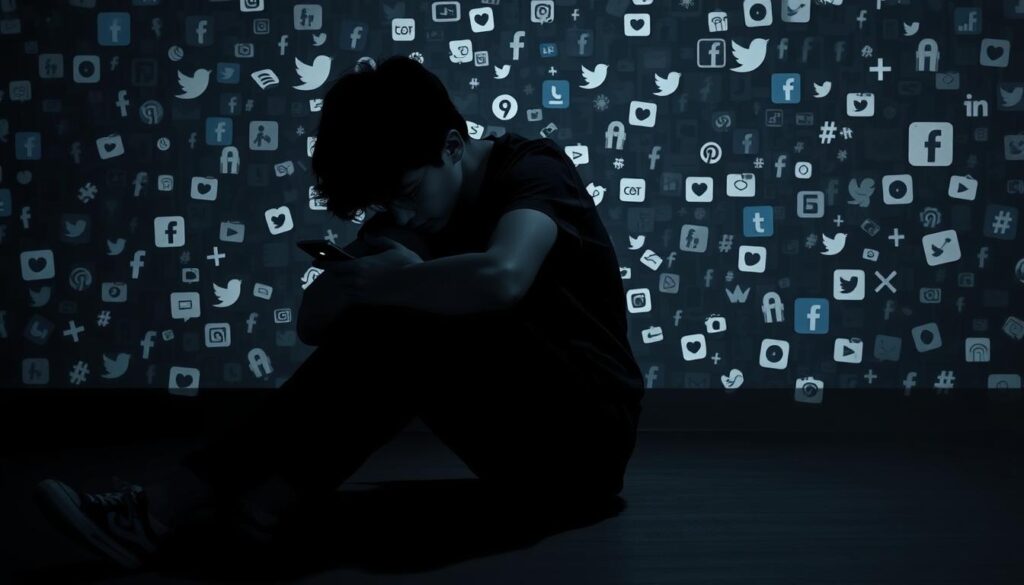Mental Health in the Digital Age How Social Media Impacts Your Well-Being

Did you know that in 2022, about 25% of young people aged 17 to 19 in the UK felt they might have a mental disorder? This is a big increase from 10% in 2017. Today, around 4.59 billion people use social media worldwide every day. Social media and mental health have a complicated link. While it can create connections and support, it can also make users feel alone, anxious, and sad. We need to be smart about how we use the internet. It’s important to know how it affects our happiness and mental health.
Looking at how social media affects mental health shows us a lot. What we do online changes how we see the world and ourselves. This can have a big impact on us.
Key Takeaways
- 1 in 4 youth in the UK may face mental health challenges in today’s digital landscape.
- Social media usage is linked with both connections and growing feelings of isolation.
- Understanding the effects of social media on mental health is crucial for online well-being.
- Research suggests that moderation in social media use can lead to improved mental health outcomes.
- Issues like cyberbullying and unrealistic portrayals can exacerbate mental health risks.
- We must prioritize developing strategies for healthier social media engagement.
- Monitoring social media use in adolescents is essential as they may struggle with impulse control.
The Role of Social Media in Modern Communication
Social media has completely changed how we talk to each other. Since Facebook started in 2004, our ways of connecting have shifted massively. Smartphones, arriving in 2007, made it even easier to access the internet. Now, we can instantly reach out to loved ones anywhere, sharing life’s moments as they happen.
Social media is key in making our friend circles bigger. About 80% of college students use it to stay close, especially when they’re apart. But, it’s not all rosy. Many feel stressed out by the pressure of social media. A whopping 70% say it ramps up their anxiety due to online interactions. It shows how social media, while connecting us, can also make us feel less confident or jealous.
There’s a delicate balance in our digital talks. Too much online chat can make our real-life connections weaker. As we move through this digital era, keeping an eye on social media’s impact on our mental health and friendships is vital.
Understanding Mental Health in the Digital Age
Mental health is about how we feel, think, and handle social situations. Nowadays, social media shapes our view of mental health. About 10% of teens are bullied online, showing a big problem for young people’s mental well-being. Studies, like one from the University of Pennsylvania, find that using social media a lot is linked to feeling more lonely and anxious.
Using social media too much can trap us in a bad cycle. Feeling bad about ourselves or lonely can make us use the internet more, which just makes us feel worse. Cutting down to 30 minutes a day can help lower anxiety, depression, and sleep issues. Social media is designed to be addictive, giving us a rush like a drug would.
Also, focusing too much on online chats can mean we ignore real-life friendships that are key for feeling good. Many who use social media end up feeling anxious or lonely. Cyberbullying can hurt us deeply, and worrying we’re missing out because of social media can really damage how we see ourselves. Social media’s impact on mental health is big and mixed, showing why we need to be mindful of how we use it.
Social Media Use and Mental Health: The Double-Edged Sword
Social media is both good and bad for mental health. Sites like Instagram and Snapchat can help us connect and feel supported. Around 84% of teens use these sites, with most having neutral or positive experiences. They allow people to share stories and emotions, creating a sense of belonging.
Yet, social media has its downsides too. Spending too much time online can make people feel depressed, anxious, and lonely. About 9% of teens report negative experiences, and many think social media is mostly harmful. Cyberbullying, which is common, can lead to depression and even thoughts of suicide.
Seeing perfect images of others’ lives can make us feel bad about ourselves. Sites like Instagram have seen a rise in harmful content, like self-injury. There are also pages that promote negative body images, which can affect our eating habits. Although social media can be a place for creativity, especially for people who feel left out, it can also be harmful to our mental health.
Effects of Social Media on Mental Health
Social media impacts our mental health in big ways. We find friends online, yet we might feel more alone. Seeking likes and comments can make us feel disconnected from real-life friends. It’s important to know how online and offline worlds affect our feelings.
Social Connection and Isolation
Social media helps us keep friendships alive. Almost all teens use it every day, feeling part of a group. But too much time online can make us lonelier. Teens on social media for hours risk their mental health greatly. It can stop us from having real conversations, leaving us feeling empty.
Impact on Self-Esteem and Body Image
Many worry about how they look because of social media. Almost half of young girls feel bad about their bodies after scrolling through feeds. Social media pushes impossible beauty goals. It makes us feel we’re not good enough. Remember, social media connects us, but it can also make us doubt ourselves.

The Psychological Effects of Social Media Usage
The psychological impact of social media usage has become a focal point in discussions about mental health. Millions use platforms like YouTube, TikTok, and Instagram. A 2022 survey showed 35% of teenagers use social media several times a day. This frequent use is linked to more anxiety and depression, a study of over 6,500 young people aged 12 to 15 in the U.S. found.
Research shows a worrying trend. Spending three hours a day on social media harms mental health. In England, a study of more than 12,000 teens showed that using social media a lot leads to poor mental health. Too much social media can make users feel left out or not good enough, especially teenagers.
Cyberbullying makes the impact of social media worse. Almost half of U.S. teens say they’ve been bullied online. This leads to more anxiety and depression. The type of content viewed is very important. Seeing things related to self-harm, eating disorders, or illegal activities can hurt mental health more, especially for those already at risk.
The American Psychological Association suggests keeping an eye on teens’ social media use to help. It’s important to know how long they’re online and what they’re looking at. This helps understand the mental health effects of digital life. As studies grow, it’s clear we need to deal with social media’s mental health effects for the health of all users.
Social Media and Mental Health: Benefits versus Risks
Today, the bond between social media and mental health offers both opportunities and challenges. Although social media has mental health perks, its risks shouldn’t be ignored. It’s vital to understand this balance as we use the internet.
Peer Support and Community Building
Social media is key in building community support for people with mental health issues. It allows users to connect and share stories. This is great for those who can’t meet others in person, offering a sense of togetherness.
Studies show social media can boost social well-being and positive mental health. This is especially true for young people. It helps fight loneliness, letting users find comfort and positivity online.
But, it’s important to note the downsides of using social media too much. High usage can hurt mental health, leading to anxiety and depression in youths. Feeling pressured to look perfect online can make users feel bad about themselves.
Social media can also increase the risk of online bullying. Many do not report cyberbullying, feeling left to deal with it alone. While it can offer support, social media might also cause negative interactions that affect mental health.
To show these effects, we’ve put together data on social media’s good and bad sides:
| Aspect | Benefits | Risks |
|---|---|---|
| Community Support | Enhances feelings of belonging and connection | Can lead to feelings of isolation if not balanced |
| Emotional Well-Being | Promotes positive mental health through engagement | Increased risk of anxiety and depression |
| Interaction Quality | Meaningful interactions can reduce stress | Superficial interactions may lead to lower life satisfaction |
| Age Group | More prevalent benefits in younger users | Higher risks in older users |
To use social media wisely, we need to find a balance. It’s key to mix online chats with real-life talks for our mental health.

Strategies for Healthy Social Media Engagement
Maintaining mental well-being is crucial with how we use social media. Setting boundaries and choosing positive content can help. This creates a supportive space online and reduces the negative impact of too much screen time.
Setting Boundaries for Usage
It’s important for our emotional health to limit social media use. Studies show that less screen time makes us feel better. We can monitor how long we’re online and set limits for ourselves.
Turning off notifications stops us from constantly checking our phones. Creating “no phone” times and places helps us connect with others face-to-face. This strengthens our relationships and supports mental health.
Utilizing Positive Content on Social Media
Focusing on positive content online can boost our mood. We should find and follow accounts that share uplifting and authentic stories. This makes us feel good and connects us emotionally.
Often, we need to check our feeds to cut out the negative. By keeping our digital spaces positive, we avoid feeling bad about ourselves. Online images that seem too perfect can make us anxious.
Understanding Social Media Addiction and Its Consequences
Social media addiction is a rising issue, especially among teenagers. Between 5% and 20% of young people might be facing this challenge. This varies based on how we define addiction. Many teens spend two to four hours on social media every day. This often disrupts their daily life due to their need to be online.
Studies show a link between too much social media and more anxiety and depression. The need to look perfect online causes stress. This drives people to want more likes and comments. Looking for this approval can make the addiction worse. This keeps users stuck in a cycle where online likes feel rewarding.
Social media addiction does more than just make you anxious. It can also worsen your sleep, which affects your mental health. It also makes some people feel bad about their body. This can lead to eating disorders, especially in young girls. Social media can distract from studying and lower how well you do in school.
Noticing signs of social media addiction is key. Signs include ignoring real-life friends and focusing too much on online life. Being aware of our online habits is important. Doing digital detoxes and setting time limits can help us use social media better. Studies say using it less, like 10 minutes per site a day, can make us feel better.
Conclusion
Mental health and social media are deeply connected. We need to be careful as we use these platforms. People spend about 2.3 hours every day on social media. So, it’s a big part of our lives.
Social media can make us feel closer to others and give important support. But it can also make us anxious, lower our self-esteem, and feel lonely. Too much time online can harm our mental well-being.
We should think about how our use of social media affects us. Good interactions on these platforms can actually help us feel better. They can make us stronger emotionally and fight off the negative feelings that can come from being online.
However, a lot of young people feel they’re using social media too much. It’s important to find a balance and use these platforms in a healthy way. This helps protect our mental health.
In this digital world, setting limits on social media use is key. We should choose to interact in ways that are positive and supportive. By doing this, we can reduce the bad effects of being online too much. Let’s work together to make sure our time online improves our mental health.
FAQ
What are the effects of social media on mental health?
Social media has its good and bad sides on mental health. It helps make connections and offer support. However, too much time on it can lead to loneliness, anxiety, and depression.
How does social media influence self-esteem?
Social media often shows unrealistic images, making people feel bad about themselves. This can hurt self-esteem by making users feel not good enough.
What strategies can we use to promote mental health while using social media?
To keep our mental health in check, limit how long you’re online. Follow uplifting accounts and enjoy content that makes you feel good.
Can social media be addictive and impact mental health?
Social media can definitely become addictive. This addiction can control our behavior, mess with our self-control, and upset our daily lives, leading to more stress and anxiety.
How can social media provide support for mental health challenges?
Social media can link us with others who share our struggles. It gives us a community and access to helpful resources. This can make us feel like we belong and support our mental health.
What should we be aware of when engaging with social media?
It’s important to watch out for dangers like cyberbullying and fake news. Also, too much scrolling without engaging can be bad for our mental health.
How does social media usage relate to feelings of isolation?
Even though social media can help us connect, spending a lot of time on it can actually make us feel lonelier. This is because we see a lot of perfect pictures that don’t match real life.











